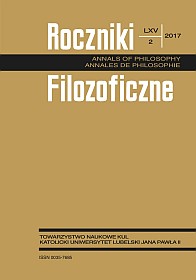The Best of All Possible Worlds and the Christian Thesis of the Corruption of the World
Abstract
Leibniz’s claim that we live is the best of all possible worlds is in contradiction with our experience, which is why we tend to maintain that the world would become better if at least some of its properties and characteristics were different. Leibniz criticized such an approach and argued that every attempt at changing the world would make it worse, or even impossible. His claim seems to be in contradiction with the Christian belief that our world is contaminated with sin, but it will be renewed in the end to become the reality of salvation, i.e. the best of all possible realities. This article puts forward two arguments: (1) Leibniz’s claim is not in contradiction with the Christian belief in salvation; (2) Leibniz’s claim is in contradiction with the human experience of the world because it is a result of an intellectual speculation based on the false assumption that the structure of the human mind adequately corresponds to the mind of God.
References
The Anathemas Against Origen. Canon XI. Christian Classics Ethereal Library. NPNF2-14. The Seven Ecumenical Councils, accessed 11.10.2016, http://www.ccel.org/ccel/schaff/npnf214.xii.ix.html.
Augustine. The City of God. Translasted by Marcus Dods. New Advent, accessed 11.10.2016. http://www.newadvent.org/fathers/120120.htm.
Couturat, Louis. Opuscules et fragments inédits de Leibniz. Paris: Alcan, 1903.
Cyril of Jerusalem. Catechetical Lecture 15, 3, http://www.newadvent.org/fathers/310115.htm.
Descartes, René. Philosophical Writings, edited and translated by Norman Kemp Smith. New York: The Modern Library, 1958.
Die Philosophischen Schriften von G. W. Leibniz. Vol. VII, edited by Carl Immanuel Gerhardt. Berlin: Weidmann, 1890.
Gilson, Étienne. God and philosophy. London: Yale University Press, 1941.
Grover, Stephen. “West Or Best? Sufficient Reason in the Leibniz-Clarke Correspondence.” Studia Leibnitiana 28 (1996), 1: 84–92.
The Holy Bible. New International Version. Containing The Old Testament and The New Testament, New York: American Bible Society 1978.
Hume, David. Dialogues concerning Natural Religion. London: s.e., 1779.
Leibnitz, Gottfried Wilhelm. La Monadologie, edited by Émile Boutroux. Paris: Delagrave, 1880.
Leibniz, Gottfried Wilhelm. Philosophical Essays, edited and translated by Roger Ariew and Daniel Garber. Indianopolis & Cambridge: Hackett Publishing Company, 1989.
Leibniz, Gottfried Wilhelm. Philosophical Texts. Translated and edited by R.S. Woolhouse and Richard Francks. Oxford: Oxford University Press 1998.
Leibniz, Gottfried Wilhelm. The Leibniz–Clarke Correspondence, edited by Hubert G. Alexander. Manchester: Manchester University Press, 1956.
Leibniz, Gottfried Wilhelm. Theodicy: Essays on the Goodness of God, the Freedom of Man, and the Origin of Evil. Translated by Eveleen M. Huggard, Chicago: Open Court 1985.
Mercer, Christia. “Leibniz on Mathematics, Methodology and the Good: A Reconsideration of the Place of Mathematics in Leibniz’s Philosophy.” Early Science and Medicine 11 (2006), 4: 424–454.
Perkins, Franklin. Leibniz: A Guide for Perplexed. London, New York: Continuum International Publishing Group, 2007.
Copyright (c) 2017 Roczniki Filozoficzne

This work is licensed under a Creative Commons Attribution-NonCommercial-NoDerivatives 4.0 International License.





